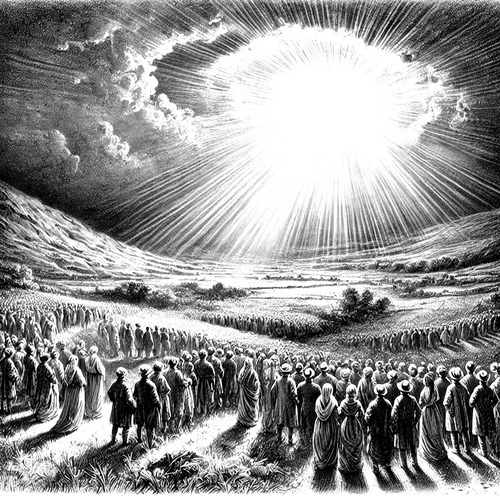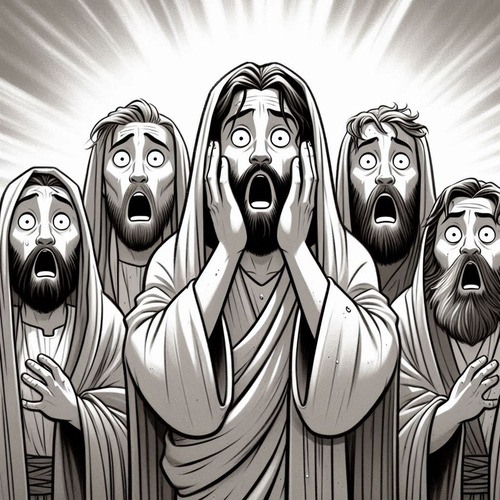Christ’s Return Foretold: Key Old Testament Prophecies
THE FOUNDATION OF PROPHETIC CREDIBILITY
Long before the first Christmas, God was meticulously weaving a prophetic tapestry that would reveal the most extraordinary story in human history. The Old Testament (OT) isn’t merely a collection of ancient texts, but a divinely inspired roadmap pointing toward Christ’s ultimate mission—both in His first coming and His promised return.
Consider the mathematical improbability of the prophecies already fulfilled: In Genesis 3:15, God first promised a “seed” who would crush the serpent’s head. Micah 5:2 precisely identified Bethlehem as the Messiah’s birthplace. Isaiah 7:14 foretold a virgin birth, while Isaiah 53 painted a detailed portrait of a suffering servant. Perhaps most remarkably, Daniel 9:24-27 provided an astonishingly precise timeline for the Messiah’s appearance.
These aren’t coincidental predictions. They’re divine signposts demonstrating God’s sovereign control over history. They establish our trust in the prophecies yet to be fulfilled.
PROPHETIC PANORAMA OF THE SECOND COMING
The OT prophets were given extraordinary glimpses into the future of God’s redemptive plan. Their writings contain profound revelations about the ultimate return of the Messiah, painting a picture of cosmic transformation and divine intervention.
- Daniel 7:13-14—The Son of Man Coming with the Clouds: This prophetic vision reveals the Messiah as a divine figure receiving an eternal kingdom. Daniel sees one “like a son of man” approaching the Ancient of Days, being given dominion, glory, and an everlasting kingdom that will never be destroyed. This prophecy transcends earthly kingship, pointing to Christ’s ultimate, universal reign.
- Zechariah 12:10—Mourning for the Pierced One: Zechariah provides a heart-wrenching prophecy of Israel’s ultimate recognition of the Messiah. The prophet describes a future moment of national mourning, where the people will look upon “the one they have pierced” and experience profound spiritual anguish. This verse speaks to a future spiritual awakening and reconciliation.
- Zechariah 14:1-5—The Day of the Lord: This passage vividly describes the Day of the Lord, a time of divine intervention and judgement. Zechariah prophesies a moment when God will gather all nations against Jerusalem, ultimately intervening personally to fight for His people. The prophecy promises a dramatic, transformative moment of divine rescue and vindication.
THEOLOGICAL FRAMEWORK OF THE SECOND COMING
From a Reformed perspective, these prophecies aren’t isolated predictions, but part of God’s comprehensive covenant plan. We see biblical prophecy as a unified narrative of redemption, where each prophetic utterance is intricately connected to God’s ultimate purpose. The sovereignty of God shines through these prophecies, demonstrating history isn’t random, but purposefully directed toward the ultimate triumph of Christ. Covenant theology views these prophecies as progressive revelations of God’s redemptive strategy, showing how the OT promises find their fulfillment In Christ’s first and second comings.
SPECIFIC PROPHETIC EXPECTATIONS
Cosmic and Celestial Signs: The prophets speak of extraordinary astronomical events that will precede Christ’s return. Joel 2:30-31 describes terrifying cosmic disruptions—blood, fire, and billows of smoke, with the sun turning to darkness and the moon to blood. These aren’t mere natural phenomena, but divine signals of the approaching day of the Lord, pointing to the magnitude of God’s final intervention in human history.
Judgement and Restoration: The prophetic vision extends beyond destruction to ultimate restoration. Malachi 4:1-3 presents a day of judgement where the arrogant and evildoers will be burned like stubble, while those who fear God’s name will experience healing and liberation. Isaiah 11:1-10 offers a stunning counterpoint—a vision of a messianic kingdom of unprecedented peace, where natural enemies will coexist harmoniously, symbolising complete spiritual and physical restoration.
THE PROPHETIC FULFILLMENT OF CHRIST’S KINGSHIP
Culmination of the Davidic Covenant: The prophecies of Christ’s kingship find their roots in the covenant God made with David. 2 Samuel 7:12-16 promises an eternal kingdom, with a descendant who will establish an everlasting throne. Psalm 2 dramatically portrays this king as divine, appointed by God to rule the nations, while Isaiah 9:6-7 describes a ruler whose government and peace will know no end.
Universal Reign: The prophets envision a time of complete divine sovereignty. Zechariah 14:9 declares the Lord will be King over the entire earth, eliminating all competing kingdoms. Daniel 2:44 reinforces this, prophesying a kingdom that will never be destroyed, but will ultimately crush and replace all earthly kingdoms. These prophecies point to a total transformation of human governance under Christ’s perfect rule.
CONCLUSION: THE CERTAINTY OF PROPHETIC FULFILLMENT
Christ is the living embodiment of God’s “Yes and Amen”—the perfect fulfillment of every divine promise. The intricate tapestry of Old Testament prophecies finds its ultimate meaning in Jesus, who bridges the gap between divine prediction and historical reality. As we contemplate these prophetic revelations, we are invited to stand in awe of a God who speaks through history, who transforms seemingly impossible promises into absolute certainty. The prophecies of Christ’s return aren’t just predictions—they’re a divine invitation to hope, to faith, and to anticipation of the most significant moment in human history.
CHRIST’S RETURN FORETOLD: RELATED FAQs
How do other Christian traditions interpret these key OT prophecies? Christian traditions interpret OT prophecies about Christ’s return through distinctly different hermeneutical approaches. Dispensationalists tend to read prophecies literally, anticipating specific geopolitical events and a future restoration of Israel, while Reformed theologians view these prophecies more typologically, seeing them as spiritually fulfilled in Christ and the Church. Amillennialists typically interpret prophetic passages allegorically, understanding them as symbolic representations of spiritual realities rather than predictive events. These variations stem from fundamental differences in theological frameworks, including perspectives on biblical interpretation, the relationship between Israel and the Church, and the nature of Christ’s kingdom.
How can we be sure these prophecies aren’t just coincidental? The sheer specificity and cumulative nature of these prophecies defy statistical probability. Multiple prophets, writing across different centuries and contexts, consistently pointed to specific details about the Messiah’s mission, location, and purpose—details that were ultimately fulfilled in Jesus Christ with remarkable precision.
Do these prophecies contradict scientific understanding? Biblical prophecies operate on a different plane from scientific empiricism, describing spiritual and eschatological realities. They speak to God’s ultimate purpose and redemptive plan, which transcends current scientific limitations and materialistic worldviews, offering a comprehensive understanding of reality that includes both spiritual and physical dimensions.
How do these OT prophecies relate to New Testament teachings about the Second Coming? The New Testament directly quotes and interprets OT prophecies, showing them as foundational to understanding Christ’s ultimate mission. Passages like Revelation build upon the prophetic visions of Daniel, Zechariah, and Isaiah, providing a more detailed eschatological framework while maintaining the core promises of the OT prophecies.
What about prophecies that seem unfulfilled or unclear? Prophetic understanding is progressive, with full clarity often revealed only in hindsight. Just as the first coming of Christ was not fully understood until after the event, some prophecies about His return may only become completely clear when they’re fulfilled, requiring faith and patient anticipation.
How do these prophecies provide comfort to believers today? These prophecies offer profound hope by demonstrating God’s sovereign control over history. They assure believers that despite current trials and global challenges, there is an ultimate purpose and a promised restoration, providing peace and perspective in challenging times.
Can someone believe in Christ’s return without understanding all these complex prophecies? Absolutely. The essence of faith is not comprehensive prophetic knowledge, but trust in God’s promises. While studying these prophecies can deepen understanding, salvation and hope in Christ’s return are founded on a personal relationship with God, not on perfect theological comprehension.
CHRIST’S RETURN FORETOLD: OUR RELATED POSTS
Editor's Pick

Can Churches Conduct Same-Sex Weddings?
In an era of rapid cultural change, churches across America face mounting pressure to redefine their understanding of marriage. As [...]

Gender Reassignment: Can Christian Doctors Perform These Surgeries?
In the quiet of a clinic, a Christian physician faces a challenging ethical question. A patient sits across the desk, [...]

‘What Sorrow Awaits You Who Are Rich…’: What Does Jesus Mean?
The words hang in the air like a sword over comfortable Christianity: “What sorrow awaits you who are rich, for [...]

Does the Bible Clearly Teach the Deity of Christ?
Critics argue Jesus never explicitly claimed to be God. Others suggest the doctrine emerged centuries later through philosophical speculation. But [...]

The Holy Spirit’s Indwelling: How Can I Be Sure I Have It?
“Am I truly saved? How can I know for certain that the Holy Spirit lives within me?” If you’ve wrestled [...]

Did Mary Remain a Virgin? A Biblical Case Against Perpetual Virginity
The question of Mary’s perpetual virginity has divided Christians for centuries. While Catholic and Orthodox traditions affirm Mary remained a [...]

Is Occam’s Razor a Compelling Argument Against Theism?
WHY THE ARGUMENT ACTUALLY POINTS TO GOD Picture this: You're in a coffee shop debate with a confident sceptic [...]

Is the Doctrine of Justification in the Old Testament?
WAS PAUL INVENTING SOMETHING NEW OR REVEALING SOMETHING ANCIENT? Picture this scene: You’re discussing faith with a thoughtful sceptic who [...]

How God Reveals Himself to Us: General and Special Revelation
Every human heart carries an undeniable longing to know ultimate truth—to understand our place in the universe and the longing [...]

Doctrine of God and Bible Interpretation: Are The Two Connected?
Picture this: Two seasoned pastors read the same verse about God's sovereignty and human responsibility. One concludes God determines all [...]
SUPPORT US:
Feel the Holy Spirit's gentle nudge to partner with us?
Donate Online:
Account Name: TRUTHS TO DIE FOR FOUNDATION
Account Number: 10243565459
Bank IFSC: IDFB0043391
Bank Name: IDFC FIRST BANK






